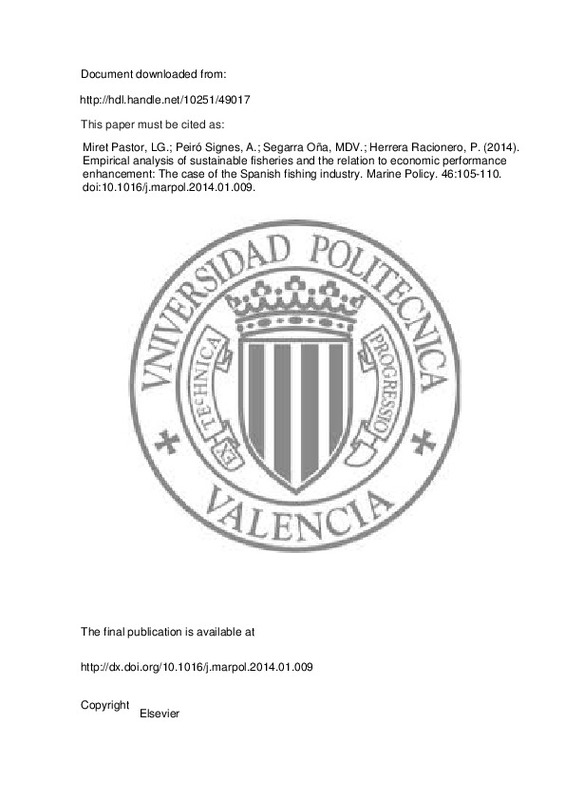JavaScript is disabled for your browser. Some features of this site may not work without it.
Buscar en RiuNet
Listar
Mi cuenta
Estadísticas
Ayuda RiuNet
Admin. UPV
Empirical analysis of sustainable fisheries and the relation to economic performance enhancement: The case of the Spanish fishing industry
Mostrar el registro sencillo del ítem
Ficheros en el ítem
| dc.contributor.author | Miret Pastor, Luis Gaspar
|
es_ES |
| dc.contributor.author | Peiró Signes, Angel
|
es_ES |
| dc.contributor.author | Segarra Oña, María del Val
|
es_ES |
| dc.contributor.author | Herrera Racionero, Paloma
|
es_ES |
| dc.date.accessioned | 2015-04-20T14:53:09Z | |
| dc.date.available | 2015-04-20T14:53:09Z | |
| dc.date.issued | 2014-05 | |
| dc.identifier.issn | 0308-597X | |
| dc.identifier.uri | http://hdl.handle.net/10251/49017 | |
| dc.description.abstract | [EN] Sustainability and fishery must be a linked concept when considering the future of the natural resources. The environmental impacts of global seafood production and the effects of the intensive exploitation of our seas and oceans are indeed an issue under study and regulation. To minimize the negative effects of the fishing activity over the environment a growing number of companies are joining the Marine Stewardship Council (MSC) certification. The MSC is a leading wild-capture fisheries certification program that involves the fishing chain of custody. The increase in the number of certifications confirms that the seafood processing industry suggest their consideration of the environmental orientation as a key element of their strategies. In this paper the MSC certification and its implications for companies' value creation process are analyzed. To do so, data from 561 Spanish firms is retrieved and a multivariate quantitative analysis is deployed. Results show that that there is a difference in the economic performance of businesses that were MSC-certified over those that were not and the moderating role of size. (C) 2014 Elsevier Ltd. All rights reserved. | es_ES |
| dc.description.sponsorship | The authors would like to thank the Spanish Economy and Competitiveness Ministry for its support through the Research Project (EC02011-27369). | |
| dc.language | Inglés | es_ES |
| dc.publisher | Elsevier | es_ES |
| dc.relation.ispartof | Marine Policy | es_ES |
| dc.rights | Reserva de todos los derechos | es_ES |
| dc.subject | Eco-labels | es_ES |
| dc.subject | Economic performance | es_ES |
| dc.subject | Environmental certifications | es_ES |
| dc.subject | Fishery industry MSC certification | es_ES |
| dc.subject | Sustainability | es_ES |
| dc.subject.classification | ECONOMIA APLICADA | es_ES |
| dc.subject.classification | ECONOMIA, SOCIOLOGIA Y POLITICA AGRARIA | es_ES |
| dc.subject.classification | ORGANIZACION DE EMPRESAS | es_ES |
| dc.title | Empirical analysis of sustainable fisheries and the relation to economic performance enhancement: The case of the Spanish fishing industry | es_ES |
| dc.type | Artículo | es_ES |
| dc.identifier.doi | 10.1016/j.marpol.2014.01.009 | |
| dc.relation.projectID | info:eu-repo/grantAgreement/MICINN//ECO2011-27369/ES/TECNICAS MULTICRITERIO Y TOMA DE DECISIONES PARTICIPATIVA PARA UNA GESTION SOSTENIBLE/ | es_ES |
| dc.rights.accessRights | Abierto | es_ES |
| dc.contributor.affiliation | Universitat Politècnica de València. Departamento de Economía y Ciencias Sociales - Departament d'Economia i Ciències Socials | es_ES |
| dc.contributor.affiliation | Universitat Politècnica de València. Departamento de Organización de Empresas - Departament d'Organització d'Empreses | es_ES |
| dc.description.bibliographicCitation | Miret Pastor, LG.; Peiró Signes, A.; Segarra Oña, MDV.; Herrera Racionero, P. (2014). Empirical analysis of sustainable fisheries and the relation to economic performance enhancement: The case of the Spanish fishing industry. Marine Policy. 46:105-110. https://doi.org/10.1016/j.marpol.2014.01.009 | es_ES |
| dc.description.accrualMethod | S | es_ES |
| dc.relation.publisherversion | http://dx.doi.org/10.1016/j.marpol.2014.01.009 | es_ES |
| dc.description.upvformatpinicio | 105 | es_ES |
| dc.description.upvformatpfin | 110 | es_ES |
| dc.type.version | info:eu-repo/semantics/publishedVersion | es_ES |
| dc.description.volume | 46 | es_ES |
| dc.relation.senia | 255461 | |
| dc.identifier.eissn | 1872-9460 | |
| dc.contributor.funder | Ministerio de Ciencia e Innovación | es_ES |







![[Cerrado]](/themes/UPV/images/candado.png)

